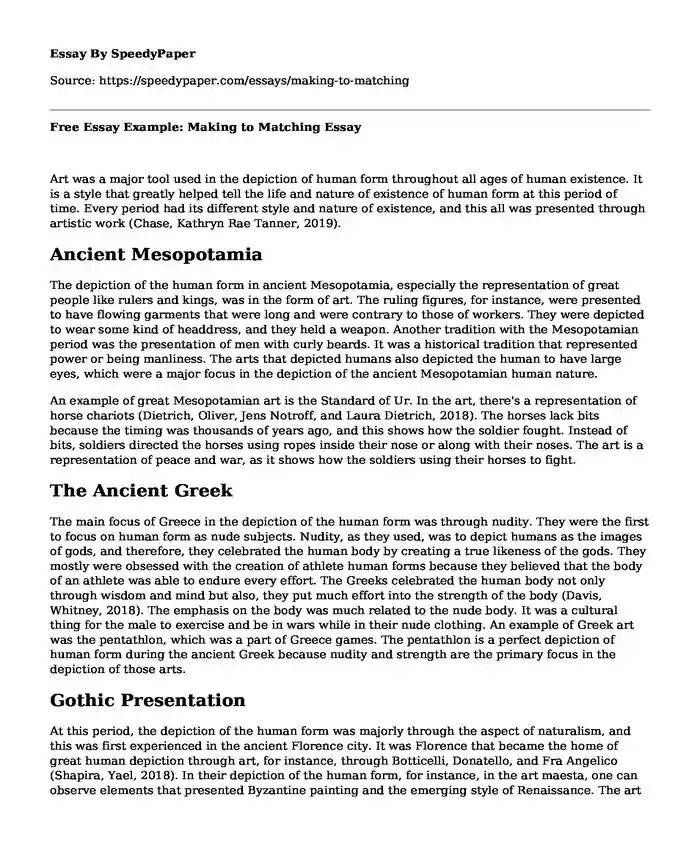
| Type of paper: | Essay |
| Categories: | History Arts Human development |
| Pages: | 3 |
| Wordcount: | 722 words |
Art was a major tool used in the depiction of human form throughout all ages of human existence. It is a style that greatly helped tell the life and nature of existence of human form at this period of time. Every period had its different style and nature of existence, and this all was presented through artistic work (Chase, Kathryn Rae Tanner, 2019).
Ancient Mesopotamia
The depiction of the human form in ancient Mesopotamia, especially the representation of great people like rulers and kings, was in the form of art. The ruling figures, for instance, were presented to have flowing garments that were long and were contrary to those of workers. They were depicted to wear some kind of headdress, and they held a weapon. Another tradition with the Mesopotamian period was the presentation of men with curly beards. It was a historical tradition that represented power or being manliness. The arts that depicted humans also depicted the human to have large eyes, which were a major focus in the depiction of the ancient Mesopotamian human nature.
An example of great Mesopotamian art is the Standard of Ur. In the art, there's a representation of horse chariots (Dietrich, Oliver, Jens Notroff, and Laura Dietrich, 2018). The horses lack bits because the timing was thousands of years ago, and this shows how the soldier fought. Instead of bits, soldiers directed the horses using ropes inside their nose or along with their noses. The art is a representation of peace and war, as it shows how the soldiers using their horses to fight.
The Ancient Greek
The main focus of Greece in the depiction of the human form was through nudity. They were the first to focus on human form as nude subjects. Nudity, as they used, was to depict humans as the images of gods, and therefore, they celebrated the human body by creating a true likeness of the gods. They mostly were obsessed with the creation of athlete human forms because they believed that the body of an athlete was able to endure every effort. The Greeks celebrated the human body not only through wisdom and mind but also, they put much effort into the strength of the body (Davis, Whitney, 2018). The emphasis on the body was much related to the nude body. It was a cultural thing for the male to exercise and be in wars while in their nude clothing. An example of Greek art was the pentathlon, which was a part of Greece games. The pentathlon is a perfect depiction of human form during the ancient Greek because nudity and strength are the primary focus in the depiction of those arts.
Gothic Presentation
At this period, the depiction of the human form was majorly through the aspect of naturalism, and this was first experienced in the ancient Florence city. It was Florence that became the home of great human depiction through art, for instance, through Botticelli, Donatello, and Fra Angelico (Shapira, Yael, 2018). In their depiction of the human form, for instance, in the art maesta, one can observe elements that presented Byzantine painting and the emerging style of Renaissance. The art has a golden texture, and the figures in the art contain the Byzantine art style.
In their presentation of art, religion was a major focus and so remained to be the primary focus behind the depiction of human art at that time (Begg et al. 2018). For instance, the Birth of Venus art by Botticelli was the initial painting that represented a mythological scene. Human depiction during the Gothic period was majorly relative to religion and naturalism of human life and their daily existence of the Italians (Grunenberg, Christop, 2016).
Bibliography
Begg, Christopher T., David A. Bosworth, John Thomas Willis, and Isaac M. Alderman. "The Ancient Near East: History, Texts, Etc." Old Testament Abstracts 41, no. 3 (2018): 567-588.
Chase, Kathryn Rae Tanner. "World Art History: Shiva Nataraja and the Concept of Agency." Ph.D. diss., 2019.
Davis, Whitney. "Did Modernism Redefine Classicism? The Ancient Modernity of Classical Greek Art." A Companion to Modern Art (2018): 73-89.
Dietrich, Oliver, Jens Notroff, and Laura Dietrich. "Masks and masquerade in the Early Neolithic: a view from Upper Mesopotamia." Time and Mind 11, no. 1 (2018): 3-21.
Grunenberg, Christoph. "American Gothic Art." American Gothic: An Edinburgh Companion (2016): 145.
Shapira, Yael. Inventing the Gothic Corpse: The Thrill of Human Remains in the Eighteenth-Century Novel. Springer, 2018.
Cite this page
Free Essay Example: Making to Matching. (2023, Apr 04). Retrieved from https://speedypaper.com/essays/making-to-matching
Request Removal
If you are the original author of this essay and no longer wish to have it published on the SpeedyPaper website, please click below to request its removal:
- Success in Life Essay Samples
- Free Essay in History: Effects of Peace Settlement of 1919
- Free Essay Sample on the Kennewick Man
- Free Essay: My Strengths, Weaknesses and Improvements on Academic Writing
- Free Essay Sample on Launching a Restaurant
- Free Essay on Computer Security Auditing
- Essay Example - Food Insecurity Areas
Popular categories




